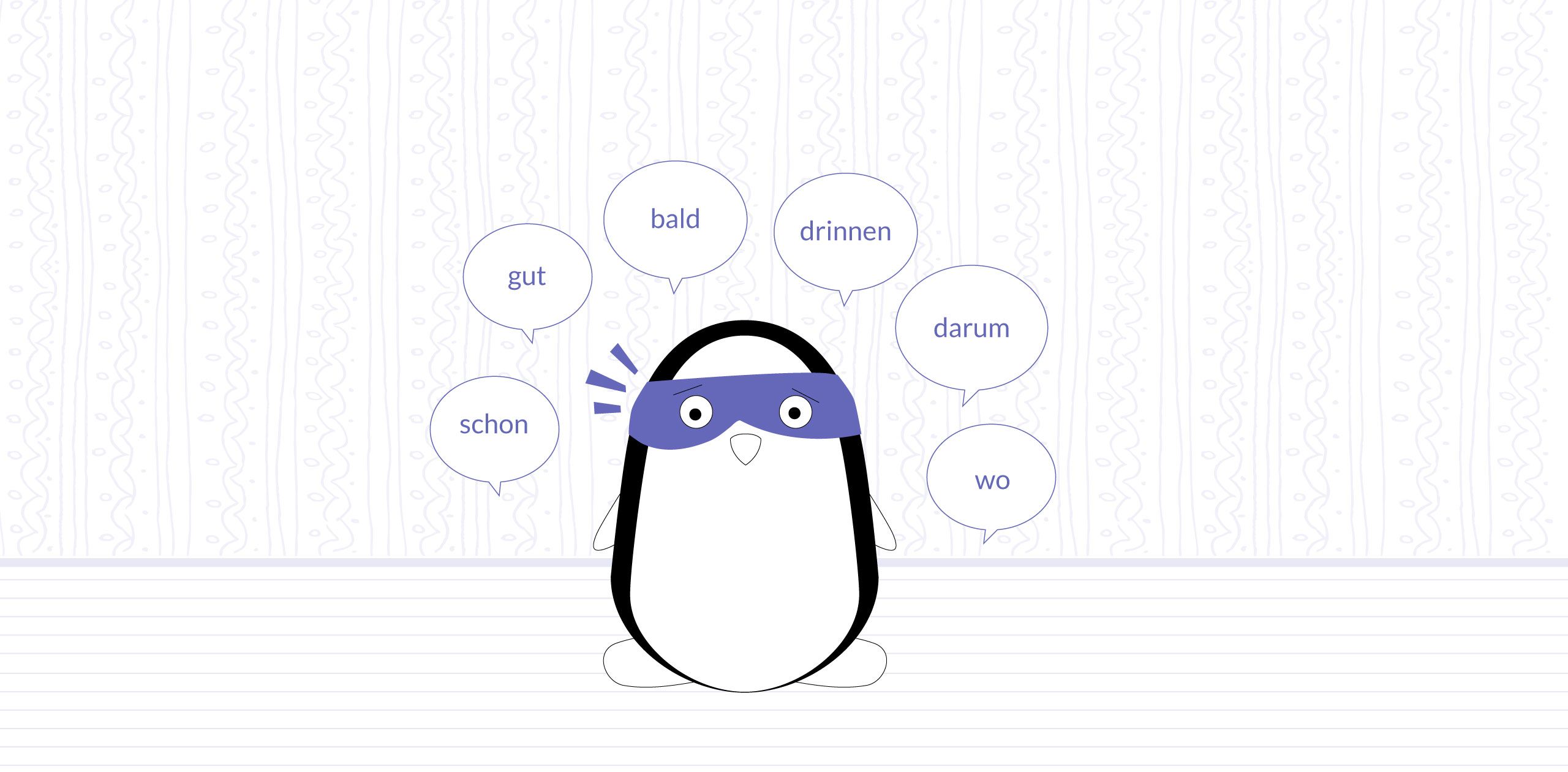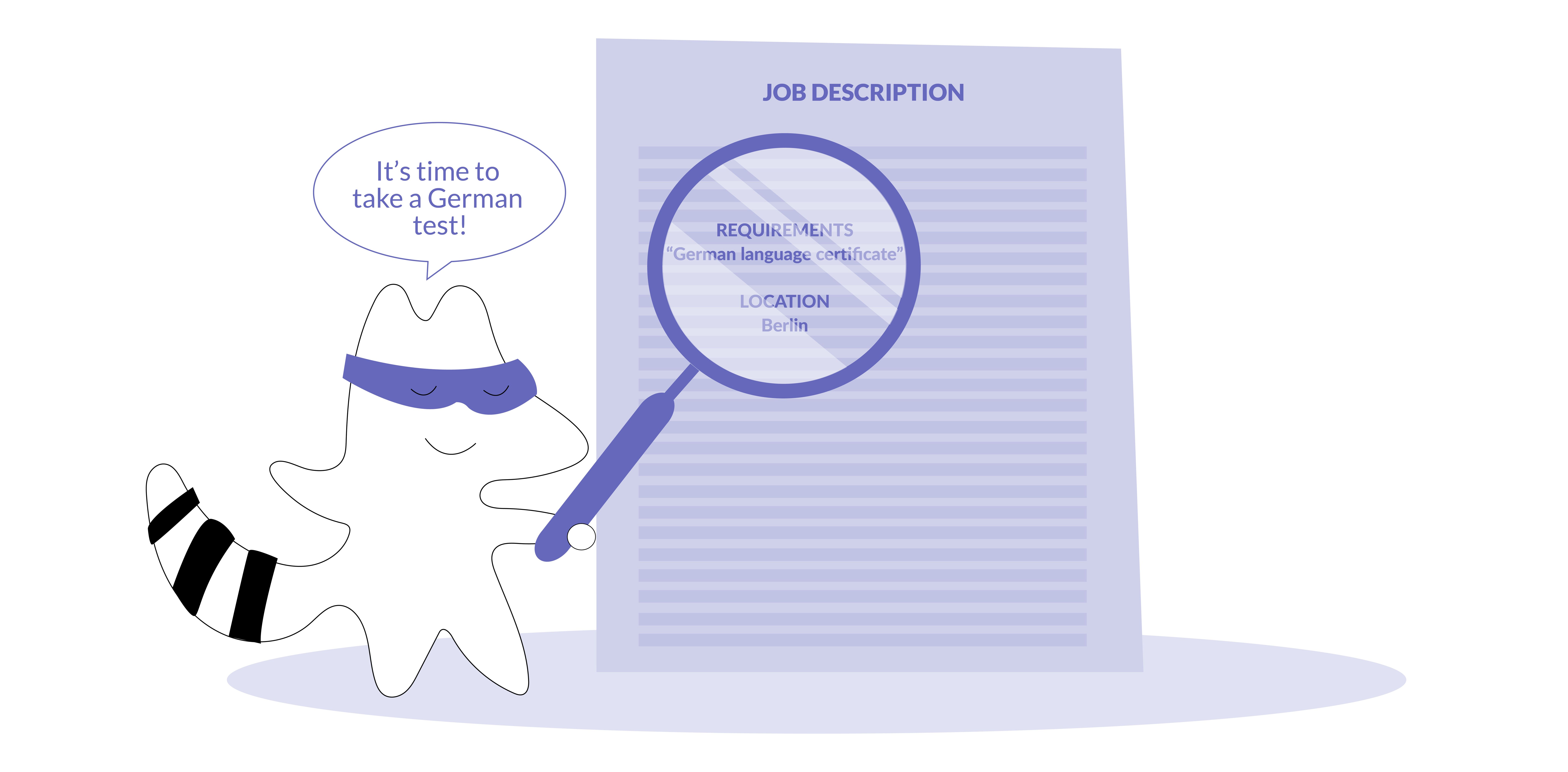
Are you learning German in Germany and want to test your new skills? Then don't hesitate any longer! Now it's easier than ever to test your knowledge of German. Besides, no matter if you're learning German for academic, professional, or personal reasons, a language certificate can open up new opportunities and serve as a testament to your dedication.
Whether you need an assessment to gain university credit or to show off your B1 Prüfung results on your CV, there are a variety of options available to aspiring multilinguals in Germany.
This article is designed to guide you through the process of choosing the right German language test for your needs, the various locations where you can take these tests in Germany, and the associated costs.
From the popular Goethe-Institut certificates to the TestDaF designed for university admissions, we'll break down the details to help you make an informed decision.
Learn German with Langster
Why Take a German Test?
As the world becomes more interconnected, being fluent in a language other than your native one has become a prized achievement. However, what’s the use in claiming proficiency if you cannot prove it?
This is where language proficiency tests come in.
For Academic and Professional Purposes
Obtaining a language certificate is crucial for students who want to study in Germany. Depending on your program, you may be required to submit proof of German proficiency as part of the application process.
The most widely accepted certificates are the Goethe-Zertifikat exams, which are recognized by institutions worldwide. Additionally, many universities accept the TestDaF or the DSH as proof of language proficiency. These tests are specifically designed for academic purposes and assess your skills in reading, listening, writing, and speaking.
For professionals seeking job opportunities in Germany, having a German language certificate can also give you a competitive edge. Employers often look for candidates who have a certain level of proficiency in the language, and a language certificate serves as tangible proof of your skills.
For the Purpose of Family Reunification in Germany
If you are planning to join a family member who is already living in Germany, you may be required to take a German language test as part of the visa application process. In some cases, non-EU citizens must pass a German language test before they can obtain a residence permit.
The most commonly accepted test for this purpose is the A1 level exam, which assesses your basic language skills and ability to communicate simply in everyday situations.
This test is also necessary for those applying for German citizenship through marriage.
For Personal Growth
Perhaps you're not planning on studying or working in Germany, but you still want to improve your German skills. Taking a German test can help you assess your current level and set goals for improvement.
It can also give you a sense of accomplishment and motivate you to continue learning.
Types of German Tests
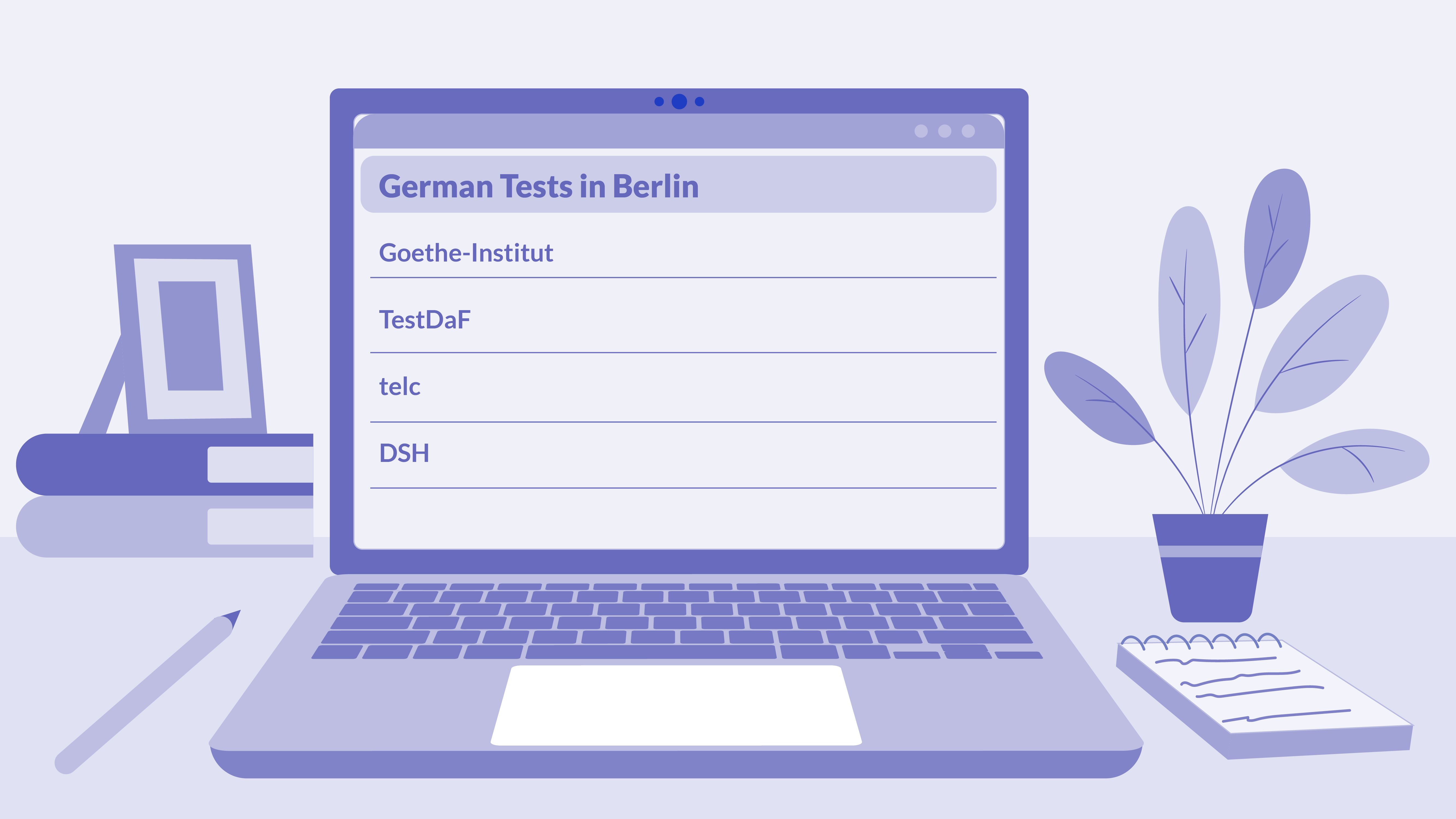
Now, if you’re a German language learner interested in taking the test, you need to know your options.
The Common European Framework of Reference for Languages (CEFR) plays a crucial role in language testing, German tests included, in Germany. CEFR is an international standard used to describe language ability.
It outlines six levels of language competence — A1, A2, B1, B2, C1, C2 — from beginner to master. These levels provide a way to compare the results of different language tests and ensure a uniform interpretation of language skills across borders.
For German tests, such as provided by the Goethe-Institut and TestDaF, the CEFR serves as a guideline for evaluating a test taker's linguistic ability. Therefore, when choosing a German test, it's important to consider the CEFR level that the exam targets, as it directly relates to your language proficiency and can impact your academic, professional, or personal goals.
Below, we take a closer look at the most common German tests available in Germany. Understanding the requirements and demands of these tests will prepare you for living and working in Germany and make your integration into German society easier.
Goethe-Institut Certificates
The Goethe-Zertifikat exams are the most well-known and recognized German language certificates worldwide. They are administered by Goethe-Institut — a non-profit organization that promotes German language and culture around the world.
There are six different levels of certificates offered, ranging from A1 for beginners to C2 for advanced speakers. The exams assess all four language skills — reading, listening, writing, and speaking — as well as language elements.
The certification is internationally recognized and accepted by employers, universities, and governmental organizations worldwide.
TestDaF
The TestDaF (Test Deutsch als Fremdsprache) is a specifically designed examination that measures the German language proficiency of non-native speakers who want to study at a German university. Hence, it’s an advanced-level language exam that covers levels B2 to C1 on the six-level CEFR scale.
Besides students, this examination is also beneficial for scientists planning research stays at German universities, providing a testament to their language competency.
Like the Goethe-Zertifikat exams, the TestDaF also assesses four language skills: reading, listening, writing, and speaking. Hence, this test is a comprehensive evaluation of a candidate's proficiency in the German language.
Adding to its credibility, the TestDaF is widely recognized by all universities in Germany, and its certificate is valid indefinitely.
One of the key advantages of the TestDaF is the ease of access provided to candidates. With over 500 test centers available across 100 countries, it allows candidates to take the test from virtually anywhere in the world.
Telc Language Tests
When it comes to language proficiency tests, telc is a name that many language learners trust. Telc is recognized all over the world for its rigorous assessments and comprehensive test formats. As a full member of the Association of Language Testers in Europe (ALTE), telc is committed to adhering to international quality standards.
In addition to general language exams, telc also offers specialized tests for academic, technical, and business language skills (Deutsch-Tests für den Beruf (DTB)), as well as German tests for migrants. Unique to telc are the dual-level exams, specifically designed for levels A2-B1, B1, B1-B2, B2, and B2-C1.
The structure of a telc examination is broken down into two parts: written and oral examination. The written part evaluates candidates on their reading and listening comprehension, grammatical and linguistic structures, and written application.
The oral examination consists of three tasks, typically in the form of an interview conducted between two candidates — although they are not allowed to communicate with each other during the preparation time.
Successful candidates receive a telc Deutsch Certificate of Proficiency, complete with the exam grade, printed and dispatched from the Central Examination Office in Germany. All telc certificates are recognized throughout the European Union and are valid indefinitely.
For candidates wishing to improve their score, telc offers the opportunity to retake specific parts of the exam (either written or oral) for B1, B2, C1, and C2 levels. It's important to note that the fees for partial examinations are the same as those for two-part exams. Hence, candidates should carefully consider their options before attempting a partial exam.
DSH
The DSH — Deutsche Sprachprüfung für den Hochschulzugang, also known as the German Language University Entrance Examination — is an essential certificate for those aspiring to study at a German university. Much like the TestDaF, the DSH is an alternative that verifies your adequate linguistic proficiency.
The DSH comprises two key components: a written and an oral examination. The written examination delves into your abilities in listening comprehension, reading comprehension, and text production, along with understanding and employing structures in academic language.
The format and tasks of the examination are crafted by the individual universities themselves, adhering to a universally applicable framework across Germany. This ensures that the standards of the examination maintain consistency throughout the country.
Unlike the TestDaF, the speaking portion of the DSH exam can only be attempted on-site at a German university, usually scheduled a few weeks before the commencement of the semester.
Passing the DSH requires fulfilling at least two-thirds of the requirements in both parts of the examination. This robust assessment ensures that successful candidates are aptly prepared for the academic language demands of studying in a German university.
Which One Should You Take?
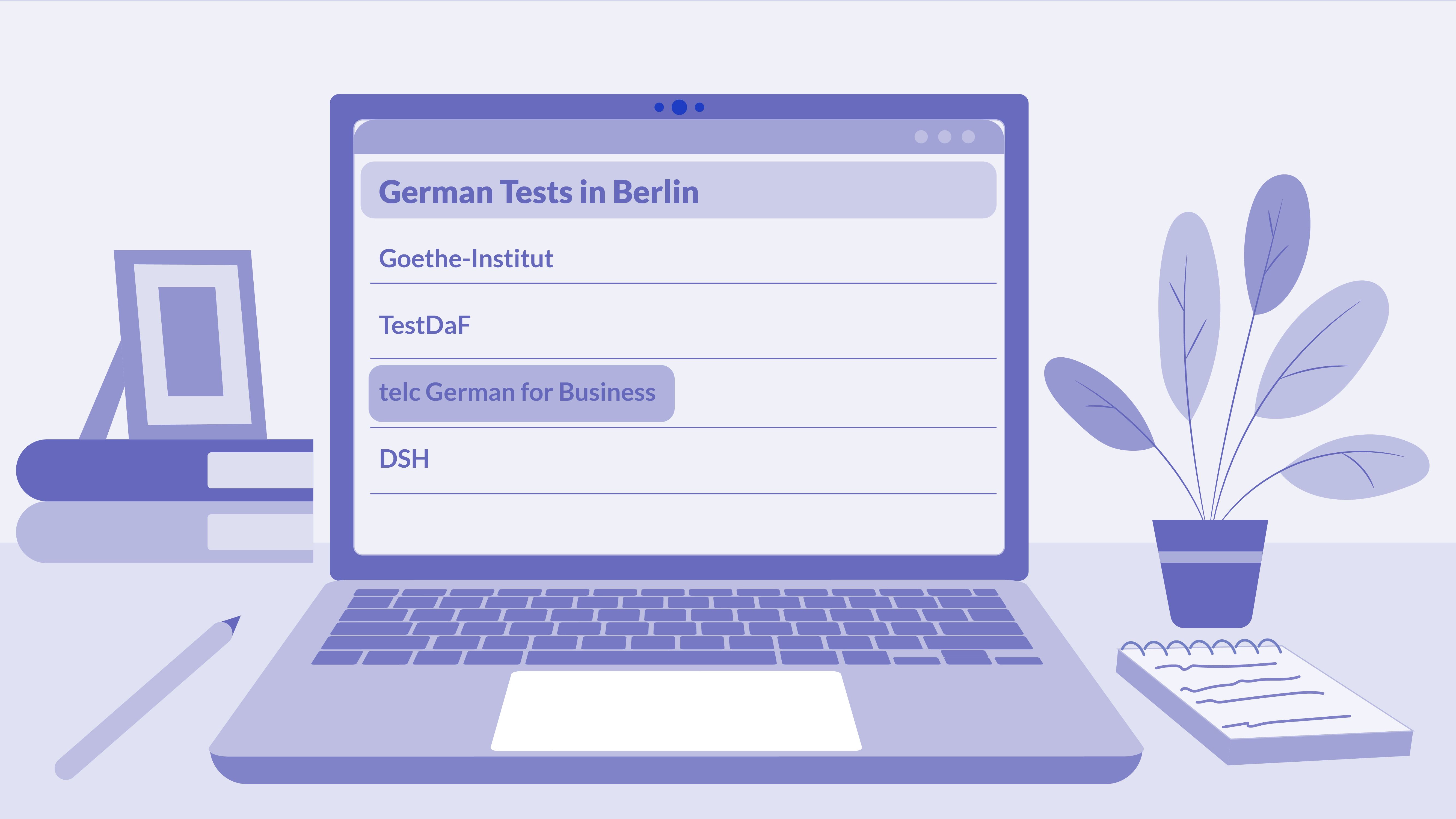
Choosing the right exam can be overwhelming. The most important factor to consider is what you need the certificate for.
If you are applying to a German university, it's crucial to check their specific requirements before deciding on an exam.
Here’s a comparison table to summarize the Prüfung zur Verfügung — exams available — and help you choose the right one for your needs.
| German Test | Proficiency Levels | Test Components | Special Features | Certificate Validity |
|---|---|---|---|---|
| Goethe-Zertifikat | A1 - C2 | Reading, Listening, Writing, Speaking | Intermationally recognized | Indefinitely |
| TestDaF | Equivalent to B2-C1 | Reading, Listening, Writing, Speaking | Required for university admission | Indefinitely |
| DSH | Equivalent to C1-C2 | Reading, Listening, Writing, Speaking | Specific focus on academic language | Indefinitely |
| telc | A1-C2 | Reading, Listening, Writing, Speaking | Specialized tests for academic, technical, and business language | Indefinitely |
| German Test | Proficiency Levels | Test Components | Special Features | Certificate Validity |
|---|---|---|---|---|
| Goethe-Zertifikat | A1 - C2 | Reading, Listening, Writing, Speaking | Intermationally recognized | Indefinitely |
| TestDaF | Equivalent to B2-C1 | Reading, Listening, Writing, Speaking | Required for university admission | Indefinitely |
| DSH | Equivalent to C1-C2 | Reading, Listening, Writing, Speaking | Specific focus on academic language | Indefinitely |
| telc | A1-C2 | Reading, Listening, Writing, Speaking | Specialized tests for academic, technical, and business language | Indefinitely |
All of these exams have their unique features and are recognized worldwide, so whichever one you choose, it will be a valuable addition to your language portfolio. If you’re still undecided about which option would work best for you, read our guide on how to select the best German language test.
Where to Take a German Test in Germany
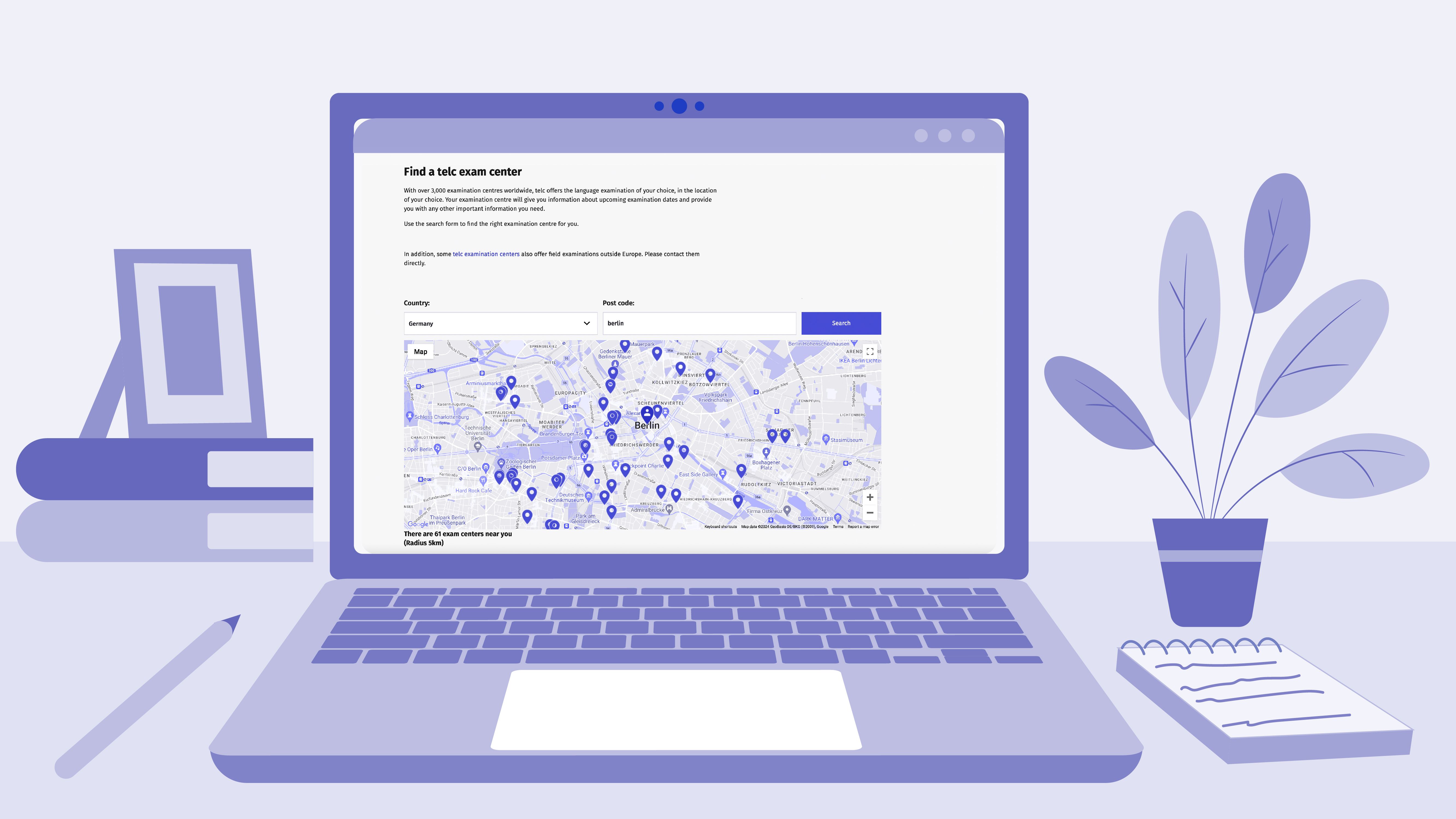
The good news is that there are many locations across Germany (and beyond!) where you can take a German language test. Here, you can find a list of the most common locations with links to their websites for additional information:
- Goethe-Institut, with over 150 locations worldwide.
- Telc exams can be taken at language schools, colleges, and universities across Germany. You can find a list of authorized examination locations on their website.
- TestDaF examinations are offered at various test centers, including universities in Germany. Check their website for a complete list of locations, or use this map to find your nearest test center in Germany.
- DSH exams can only be taken at German universities, so if you are going to participate in this option, you need to check with your desired university for more information.
It's essential to register early for your chosen exam as spots fill up quickly. Additionally, it's recommended to take the test in a location where you feel comfortable and confident. Some candidates may prefer taking the exam in a familiar city, while others may opt for a new location to avoid distractions and maintain focus.
Ultimately, the choice is yours, and what matters most is that you are well-prepared for the exam. So, choose accordingly!
Fees and Costs of Taking an Exam in Germany
Taking a German language exam in Germany comes with fees and costs that candidates should be aware of. The final sum varies depending on the exam provider, location, and level of proficiency.
Generally, the cost ranges from €80-200 for levels A1-B2 and €140-255 for C1-C2. These fees cover the examination itself, as well as the issuance of a certificate upon passing. For instance, a DSH exam fee is €150, plus a free-of-charge certificate, while telc exams start at €159 for A1 and go up to €219 for C1, plus an additional €30 late registration fee.
Some exam providers also offer preparation courses at an additional cost, which can help candidates better prepare for the exam.
It's important to note that these fees are subject to change and may vary depending on additional factors, such as location, currency exchange rates, and other administrative costs.
Candidates should check with their chosen exam provider for the most up-to-date information on fees and costs.
German Exam Preparation Tips
Preparing for exams requires a lot of time, effort, and resources, and oftentimes can feel challenging and stressful. In addition to your regular studies, here are some tips you can incorporate to prepare effectively and confidently:
- Familiarize yourself with the exam format and structure. Knowing what to expect on the day of the exam can help reduce anxiety and allow you to focus on answering questions.
- Practice regularly. Set aside time each day to practice reading, listening, writing, and speaking in German. This will help you become more comfortable with the language and improve your overall proficiency.
- Take a preparation course. Many exam providers offer preparation courses that can familiarize you with the exam format and provide helpful tips for success. These courses can also help you identify areas where you may need to focus on more.
- Use study materials. There are many study materials available, such as textbooks, workbooks, and online resources, that can help you prepare for the exam. Choose ones that suit your learning style and focus on areas that need improvement. Furthermore, some examiners provide free preparation materials on their websites.
- Practice with past exams. Familiarize yourself with previous exam questions to get a sense of what may be asked on the day of the test. Some exam providers also offer practice tests and sample exams for candidates.
- Learn German with Langster. Language learning apps are excellent tools that will make your learning process more efficient and fun. Our Langster app focuses on improving your language comprehension with bite-sized stories and audio from native German speakers.
Remember that preparation is key to success on any exam, so make sure to dedicate enough time and effort into your studies. With determination and hard work, you can achieve great results!
The Bottom Line
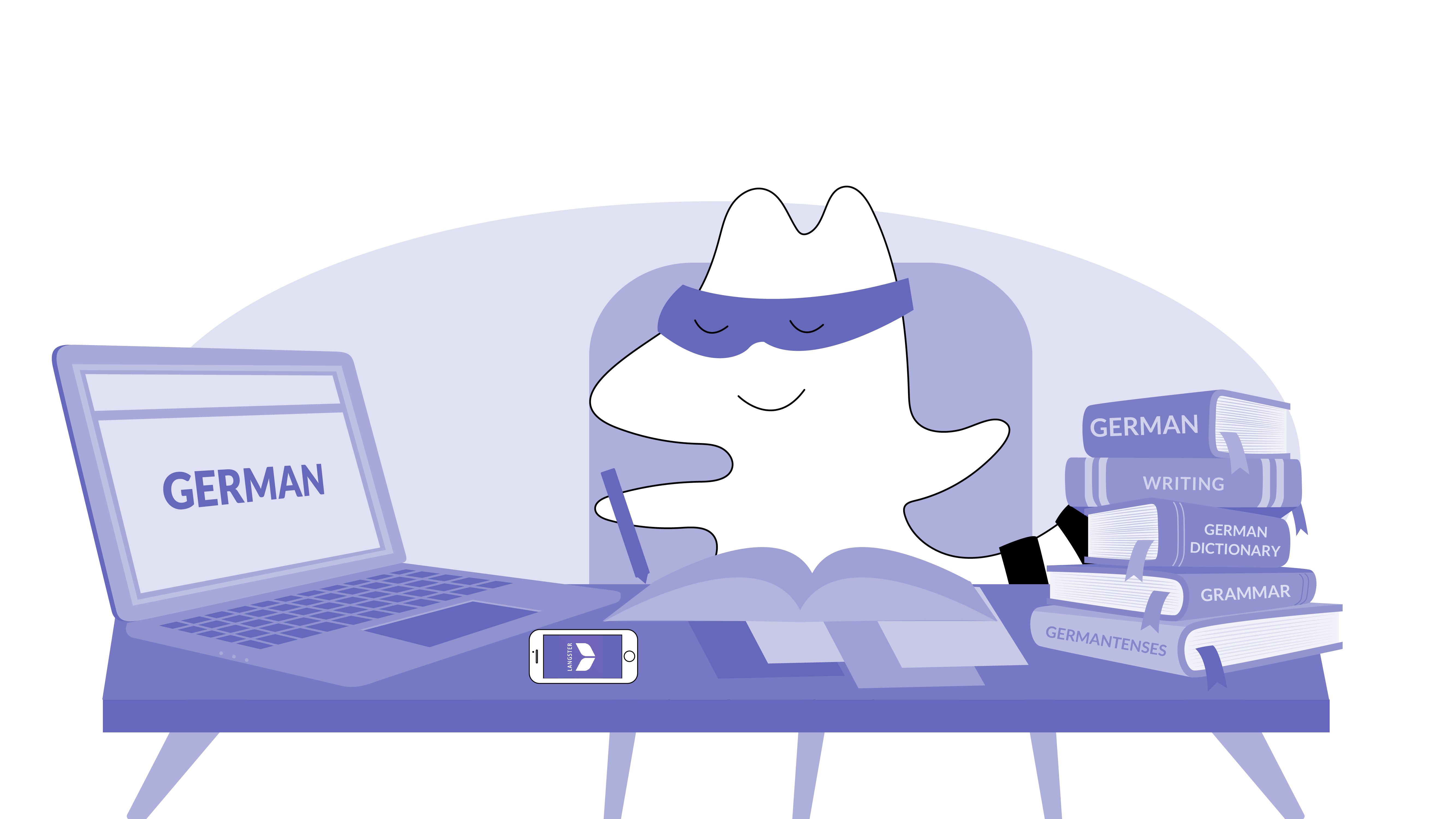
Taking a German language exam is an excellent way to showcase your proficiency in the language and open up opportunities for education, work, or personal growth. With different exams to choose from, it's essential to research and find the right one for your needs.
Remember to register early and prepare diligently for the exam. Lastly, have confidence in yourself and trust in your abilities! Viel Glück!
So, what are you waiting for? Choose an exam that aligns with your goals, and start preparing today!
Learn German with Langster







